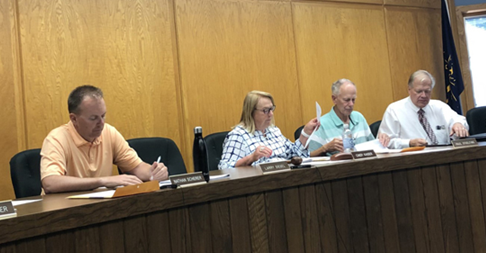
Denise Fedorow
Times-Union
SYRACUSE – Despite an impassioned plea by town residents to be allowed to keep their chickens, the Syracuse Town Council said Tuesday they’ll continue to enforce the town ordinance prohibiting farm animals in city limits.
Amelia Abramson, who lives at 301 W. High St., said they own chickens, and the code enforcement officer came about a month ago and told them they couldn’t have chickens, resulting in a “verbal dispute between the code enforcement officer and my husband.”
She said they ended up calling the police because the code enforcement officer wouldn’t leave their property and the situation caused their family emotional, physical and mental stress. Abramson read from a letter she brought.
“Everyone who pays property taxes should be allowed to do whatever they want on their property as long as it’s not hurting anyone,” she said.
She said they started a petition. “My family and others in the community find it constitutionally, logically and ethically wrong for a council to deny its citizens the right to own such animals — whether they’re pets or a food source.”
She became emotional as she read the letter and also cited the Declaration of Independence and said the town was denying them and the community the right to live a self-sustaining lifestyle. She said the chickens were mental support for her family and a learning environment for her homeschooled son, teaching him kindness and responsibility among other things, as well as an opportunity for 4-H.
She said she and her son have Native American ancestry and she wants to live that way. The reason the code enforcement officer gave them was health reasons like bird flu, but her research didn’t come up with any cases in the U.S.
She concluded, “We believe we have the right to own them and to provide for ourselves and our neighbors. For a local government to deny it’s community the right to provide for themselves and others should be shameful.”
Councilman Paul Stoelting asked how many chickens they have and she responded 10 but suggested that number would decrease as the animals reach maturity.
Michael Abramson said there’s a lot of confusion in the community about whether chickens are allowed or not with most believing they are allowed.
Councilman Bill Musser asked, “Did it dawn on you to check the ordinance before you got the chickens?”
Michael admitted they hadn’t, saying, “We’ve lived here nine years and we’ve never had anyone tell us we couldn’t.”
He said they went a few years without chickens but now that they have them, “it’s hard to rip them away from my son.”
Council President Cindy Kaiser said other children live in the city limits and kept livestock outside the city limits so they can participate in 4-H.
Councilman Nathan Scherer thanked Amelia for sharing, acknowledging that it was hard for her to do.
“But ordinances affect the whole town and we have to balance that out — what’s best for the town collectively, not just individuals,” he said. “Not everyone feels the same as you do. I’m sympathetic and I hear you, but I feel if we have an ordinance we need to enforce it.”
Kaiser said this issue came up about six months ago and “we were all in agreement to keep the ordinance as it is.”
Stoelting said, “That was a tremendous presentation and I was very moved by it.”
He then added, “I wonder if we should have exceptions? Maybe limit the number? I’m just throwing it out there.”
Town Manager Dave Wilkinson said he’d been through this before in other communities and said farm animals include cows, pigs and horses, etc. “If you open it for one, you open it for all farm animals — just keep that in mind.”
To read the entire story, click here.




